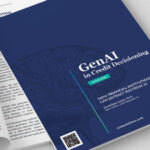From national protests to a fraught election cycle to a pandemic that ravaged every corner of our lives, we’ve all endured challenge and change in 2020. The financial services industry was not immune to this rollercoaster ride, and banks and other financial institutions (FIs) are still working to navigate changing realities like:
- Closed bank branches
- Consumers quickly and broadly adopting digital banking
- Widespread job losses
- Record low interest rates
This litany of issues was something companies had to tackle head on – while managing risk, operations and continuity.
Quick Pivot, Lasting Impact
Many organizations instantly committed to supporting the tens of millions of individuals who lost their jobs or were furloughed as the country went into lockdown. They continue to offer relief in various forms that included forbearance and payment deferrals, short- and long-term payment plans and fee waivers.
But as institutional and governmental support potentially mask the true picture of an individual’s financial status, credit and fraud risk has become more opaque. While the origination landscape adapts to our new normal, traditional products like credit cards, white label/retail cards, retail financing, auto loans and demand deposit accounts are shifting too.
2020 is the first of at least 14 years (the oldest point in history included in this analysis) where consumers added new accounts but decreased their overall debt burden.²
Demand Deposit Accounts
For demand deposit accounts, the changes have been dramatic. Banks and FIs are flush with record amounts of liquidity, after seeing more than $2 trillion in cash deposits in 2020. Autonomous Research analyst Brian Foran sums up the current situation succinctly: “Banks are flooded with cash, they’re like Scrooge McDuck swimming in money.”¹
Other market forces like historically low federal rates, a rush to digital banking and consumer preferences have all impacted a bank’s ability to capture and retain low-risk, high-profit customers. In fact, the primary beneficiaries of this glut of deposits has been the largest 20 banks, which have collectively captured more than 66% of the cash.
Credit Cards
Credit cards, a long-time staple of growth and acquisition for banks, have exhibited strange behavior throughout the year. While there has been an increase in consumer card numbers, total card debt has been declining as consumers pay down existing balances with stimulus dollars. In a recent blog post, Experian noted that “2020 is the first of at least 14 years (the oldest point in history included in this analysis) where consumers added new accounts but decreased their overall debt burden.”²
When the pandemic gripped the world and unemployment skyrocketed, many individuals requested forbearance or deferral for outstanding debt, including prime and super prime individuals. As a result, average scores for applicants have increased, and lenders are decreasing their risk exposure by reducing the number of cards issued to high-risk tiers like subprime and deep subprime customers.
Looking Ahead: Retail Card, Auto Loans
In part 2 of this series, we’ll examine the impact of the novel coronavirus on other lines of business, like auto loans and retail/white label cards, as well as consumer installment lending. In the meantime, if you want to enable seamless, real-time connections to all your internal data, as well as any third party and alternative data source, let’s talk.
[2] https://www.experian.com/blogs/ask-experian/state-of-credit-cards/[/vc_column_text][/vc_column][/vc_row]





